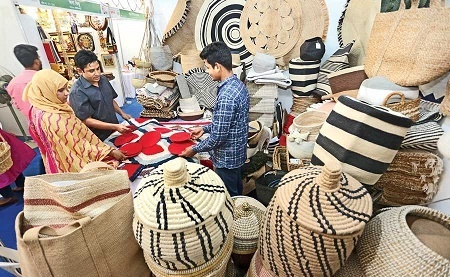
Central bank to support SMEs build resilience

Bangladesh Bank (BB) will provide a total of Tk 600 billion financing to Small and Medium Enterprises (SMEs) by 2023 to ensure economic resilience that will enhance GDP, employment, and inclusive development.
Deputy Governor of the central bank Abu Farah Md Naser said this at the Virtual Dialogue titled "Creating Resilient Recovery for Businesses through Enhancing Investment Opportunities: A Case of Southwest Bangladesh."
Business Initiative Leading Development (BUILD) with support from the PROKAS programme of the British Council organised the dialogue, reports UNB.
As the Chief Guest of the programme, Md Naser also said the Bank has taken the initiative to extend the timeline of the current stimulus package by 2023.
"Some Tk20 billion collateral-free loan opportunity for SMEs made available under the credit guarantee scheme should be utilised as much as possible," he added.
He held the example of City Bank's Leno financing model that uses digital technology to process loan applications in the shortest possible time and encouraged other banks to follow the example. For banks operating in grassroots level, he encouraged digital technology to ensure that loan evaluation and processing can be managed in the shortest possible time.
Md Naser thanked BUILD for organising the meeting to address the concerns of cottage, micro, and small enterprises from remote regions.
"The central bank is also facilitating expansion of aggregate demand by nurturing Bank-MFI linkages that has a base of 30 million people across the country," he added.
During the discussion, the Mayor of the Mongla Municipality of the Bagerhat District Sk Abdur Rahman, mentioned that the neediest section of the population: the cottage enterprises, fishermen and the working class have largely missed the benefits of the package.
He suggested that banks should provide not only credit but also technical support to ensure that the credit is properly utilised for repayment.
"Training and capacity building provided by the government at the local level should be scaled up," he encouraged speedy completion of the Mongla airport to ensure accelerated investment and development in the region.
BUILD Chairperson Abul Kasem Khan noted that the COVID-19 has affected business all around the country, especially the MSMEs. The timely initiatives by the Prime Minister and the government to prepare the country to tackle the health challenges as well as economic effects of the pandemic combined with the all-out action by the Bangladesh Bank and other government agencies were instrumental in protecting the country from the worst consequences.
"Aside from supply side interventions, there also need to be demand side initiatives so that the income and consumption of the ordinary people can be boosted to re-inject dynamism in the economy.," he added.
He requested for social safety bond for the small entrepreneurs and some tax changes in the Tax policy and extend tax incentives so that large scale industries can also sustained.
BUILD's CEO Ferdaus Ara Begum informed in reply to a point raised by BB that BUILD is working closely with the Ministry of Industries to get the definition of cottage, micro, small and medium enterprises to ensure that smaller and vulnerable businesses receive more policy priority and support.
"As BUILD continues to engage in research and facilitation of the businesses in Mongla and Bagerhat the support from the central bank will be essential," she also added.
In the keynote presentation, Md. Tahmid Zami, Additional Research Director of BUILD noted that in the local BSCIC Industrial Estate of Mongla, around 50 per cent businesses are out of operation and only 20 per cent workers are retained in many factories.
"The coconut oil mills, rice mills, small traders, and many other sectors have faced tremendous shock due to the COVID-19. Finance should be distributed to the cottage, micro and small enterprises without stringent requirements for rescuing the endangered businesses,´ Tahmid added.
He referred the e-survey in the form of a KPI conducted by BUILD during February-March, 2021 covering chamber representatives, local Government and BSCIC, Bank officials and Businesses.
Husne Ara Shikha, General Manager of SME and Special Credits Department informed about 6.0 per cent of total money disbursed for SME have gone of Southwest region, in case of women, in number it is about 5.43 per cent of the total and noted that there are both positive signs and mixed results in distributing credit to SMEs in the region.
Syed Abdul Momen, Head of SMEs of BRAC Bank mentioned that the definition of SMEs should be modified to target the cottage, micro and smaller enterprises more effectively.
The decentralised credit management of BRAC and the agent banking sets a good example for the banking industry of the country for meeting the needs of the businesses in the rural level.
S Humayun Kabir, Vice President of Bangladesh Frozen Foods Exporters Association requested for a proper insurance policy for the shrimp industry as well as higher incentives such as cash subsidy to ensure better development of the high-potential sector. Cold storage facility for the shrimp and fish sectors should be boosted.
He further suggested to consider the sector as agro-based sector while extending support facilities. In case of getting finance Banks and FI request for higher collateral considering uncertainty of the production.
Md. Mofidul Islam Tutul, Director of Khulna Chamber of Commerce and Industry stressed on the prospects of the jute sector.
Editor & Publisher: S. M. Mesbah Uddin
Published by the Editor from House-45,
Road-3, Section-12, Pallabi, Mirpur
Dhaka-1216, Bangladesh
Call: +01713180024 & 0167 538 3357
News & Commercial Office :
Phone: 096 9612 7234 & 096 1175 5298
e-mail: financialpostbd@gmail.com
HAC & Marketing (Advertisement)
Call: 01616 521 297
e-mail: tdfpad@gmail.com